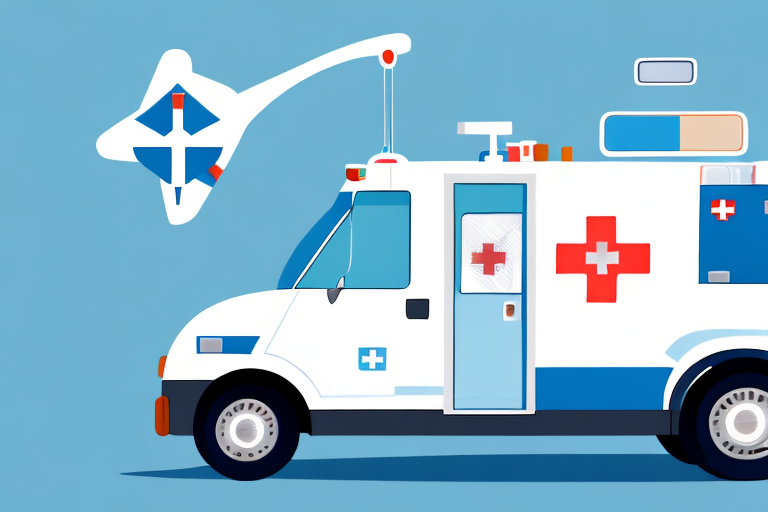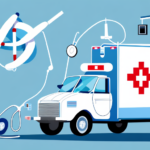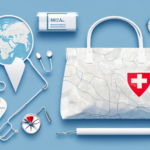Understanding the Importance of Medical Courier Services
Medical courier services have seen significant growth in recent years, reflecting the increasing reliance of the healthcare industry on specialized logistics. According to a report by Grand View Research, the global medical courier services market is expected to grow at a compound annual growth rate (CAGR) of 7.5% from 2023 to 2030. These services offer numerous advantages over traditional delivery systems, particularly in the transportation of critical medical supplies and samples.
Essential Role in Healthcare Operations
Medical courier services are vital for the seamless operation of healthcare facilities. They ensure the reliable transportation of sensitive medical supplies such as blood products, laboratory specimens, and vaccines. For instance, the timely delivery of refrigerated vaccines is crucial for maintaining their efficacy, especially in emergency scenarios.
Support for Clinical Trials
Clinical trials often involve the transportation of biological samples, medical equipment, and other essential supplies between research sites and laboratories. Medical courier services provide the necessary infrastructure to handle these materials safely and efficiently, contributing significantly to the success of clinical research. Real-time tracking and monitoring systems further enhance the reliability of these services.
Enhancing Home Healthcare Services
With the rise of home healthcare services, the demand for reliable delivery of medical supplies and equipment has surged. Medical courier services offer a convenient solution by delivering items such as oxygen tanks, catheters, and wound dressings directly to patients' homes, ensuring timely access to necessary medical care.
Ensuring Safe and Timely Delivery of Medical Supplies
Medical courier services implement rigorous protocols to guarantee the safety and punctual delivery of medical supplies. Couriers receive specialized training to handle medical items appropriately, utilizing temperature-controlled packaging and biohazard containers when necessary.
Advanced Tracking and Monitoring
Utilizing GPS tracking systems, medical courier services monitor shipments in real-time, ensuring that deliveries are made on schedule and to the correct locations. This technology is particularly crucial for time-sensitive deliveries such as organ transplants or emergency medical supplies.
Specialized Delivery Options
Medical courier services offer tailored delivery solutions, including same-day or immediate delivery options for urgent requests. Customized delivery schedules are also available to meet the specific needs of healthcare facilities, such as regular pickups and deliveries on designated days.
The Role of Technology in Enhancing Medical Courier Services
Technology is a cornerstone in the advancement of medical courier services, driving improvements in efficiency, reliability, and security.
Barcode Scanning and Automation
Barcode scanning technology ensures accurate tracking and delivery of medical shipments, reducing the risk of loss or misplacement. Automated systems facilitate quick identification of delivery issues, allowing for prompt resolution.
Mobile Apps and Online Portals
Many medical courier services provide online portals and mobile applications that enable clients to track their deliveries in real-time. These platforms offer added convenience and transparency, allowing healthcare providers to monitor the status of their shipments continuously.
Predictive Analytics and Route Optimization
Advanced analytics tools help optimize delivery routes and schedules, minimizing delivery times and reducing operational costs. Machine learning algorithms analyze delivery data to identify areas for improvement, such as enhancing packaging methods or streamlining delivery processes.
Comparing Traditional Delivery Systems with Medical Courier Services
While traditional delivery systems are more cost-effective for general shipments, they fall short in handling the specialized needs of medical deliveries.
Specialized Training and Equipment
Medical courier services are equipped with the necessary training and equipment to handle sensitive medical items, including temperature-controlled environments and secure transportation protocols. Traditional delivery services lack this level of specialization, compromising the integrity of medical supplies.
Enhanced Accountability and Tracking
Unlike traditional delivery systems, medical couriers provide comprehensive tracking and detailed reporting, ensuring accountability and transparency throughout the delivery process. This level of oversight is essential for maintaining the quality and reliability of medical shipments.
Advantages of Using a Specialized Medical Courier Service Provider
Opting for a specialized medical courier service offers numerous benefits over generic delivery options.
Expertise and Reliability
Medical couriers possess specialized knowledge in handling medical supplies, ensuring that items are transported safely and efficiently. Their reliability is crucial for maintaining the smooth operation of healthcare services.
Confidentiality and Security
Specialized medical courier services prioritize the confidentiality and security of medical information and materials. Secure packaging and strict protocols ensure that sensitive data and specimens are protected during transit.
Regulatory Compliance
Medical couriers are well-versed in the regulatory requirements governing the transportation of medical supplies. They adhere to guidelines set by organizations such as the FDA and the CDC, ensuring compliance and avoiding potential legal issues.
Medical Courier Services in Emergency Situations
In emergency scenarios, the efficiency and reliability of medical courier services are paramount.
Rapid Response and 24/7 Availability
Medical couriers offer round-the-clock delivery options, enabling swift transportation of critical supplies during emergencies. Their ability to respond quickly can significantly impact patient outcomes in urgent situations.
Disaster Relief Efforts
During natural disasters or other crises, medical courier services play a crucial role in delivering essential medical supplies to affected areas, supporting disaster relief efforts and saving lives.
Support for Research and Clinical Trials
Medical couriers facilitate the efficient transport of biological samples for research and clinical trials, ensuring that studies proceed without delays and that data integrity is maintained.
Choosing the Right Medical Courier Service Provider
Selecting an appropriate medical courier service provider involves evaluating several key factors to ensure optimal service quality and reliability.
Proven Track Record
Look for providers with a history of dependable service, demonstrating expertise in handling medical shipments and maintaining high standards of safety and security.
Specialized Training and Equipment
Ensure that the provider offers specialized training for their couriers and utilizes the necessary equipment for handling medical supplies, such as temperature-controlled packaging.
Cost-Effectiveness and Value-Added Services
Consider the cost of services and examine any additional offerings, such as real-time tracking, customized delivery options, and detailed reporting, which can provide added value and enhance overall efficiency.
Legal Requirements for Transporting Medical Supplies and Samples
Transporting medical supplies and samples involves adhering to a range of legal requirements and regulations to ensure safety and compliance.
Regulatory Compliance
Medical courier providers must comply with federal and state regulations related to the transportation of biohazardous materials and temperature-sensitive shipments. Adherence to standards set by the FDA and the CDC is essential.
Insurance Coverage
Proper insurance coverage is necessary to protect against potential loss or damage during transport. Ensure that the courier service has comprehensive insurance policies in place.
Cost-Effective Solutions Offered by Medical Courier Services
Despite the specialized nature of medical courier services, they can be a cost-effective solution for healthcare facilities.
Customized Delivery Options
Tailored delivery schedules and optimized routes help reduce operational costs, making medical courier services a financially viable option for healthcare providers.
Long-Term Savings
By improving delivery efficiency and reducing the likelihood of shipment delays or losses, medical courier services can contribute to significant long-term savings for healthcare facilities.
Best Practices for Managing Deliveries with a Medical Courier Service
Implementing best practices ensures the effective management of medical deliveries, enhancing reliability and efficiency.
Proper Packaging and Labeling
Ensure that all medical supplies and samples are correctly packaged and labeled according to industry standards to prevent damage and ensure accurate identification.
Clear Delivery Instructions
Provide detailed and precise delivery instructions to avoid misunderstandings and ensure that shipments reach their intended destinations promptly.
Regular Communication
Maintain open lines of communication with your medical courier service provider to stay informed about delivery statuses and promptly address any issues that arise.
Future Trends in the Evolution of Medical Courier Services
The landscape of medical courier services is evolving rapidly, driven by technological advancements and the changing needs of the healthcare industry.
Integration of Drones and Autonomous Vehicles
Emerging technologies such as drones and autonomous vehicles are set to revolutionize medical deliveries, enabling faster and more efficient transportation of medical supplies, especially in remote or hard-to-reach areas.
Expansion of Service Offerings
Medical courier services are likely to expand their offerings to include additional value-added services, such as medical waste removal and equipment maintenance, providing comprehensive logistical support to healthcare facilities.
Enhanced Data Analytics
Improved data analytics tools will allow medical couriers to better predict demand, optimize delivery routes, and enhance overall service quality, further integrating their operations with the broader healthcare ecosystem.
Case Studies: Successful Medical Deliveries with Couriers
Real-life examples illustrate the critical role of medical courier services in the healthcare industry.
Disaster Response During the COVID-19 Pandemic
During the COVID-19 pandemic, medical courier services were instrumental in delivering vaccines and essential medical supplies to various healthcare facilities, ensuring that vaccination campaigns proceeded without significant delays. Services adapted quickly to increased demand, showcasing their flexibility and reliability under pressure.
Transporting Critical Samples in Clinical Trials
A leading pharmaceutical company relied on a specialized medical courier service to transport biological samples between research sites and laboratories. The courier's adherence to strict protocols ensured the integrity of the samples, contributing to the successful progression of the clinical trial.
Improving Healthcare Facility Efficiency with Reliable Medical Courier Services
Partnering with a dependable medical courier service can significantly enhance the efficiency of healthcare facilities.
Streamlined Logistics
Medical courier services handle the complexities of supply transportation, allowing healthcare providers to focus on patient care rather than logistical challenges.
Enhanced Patient Care
Timely delivery of medical supplies and samples ensures that patients receive the necessary treatments without delays, improving overall patient outcomes and satisfaction.
Operational Efficiency
By optimizing delivery schedules and routes, medical couriers help healthcare facilities reduce operational costs and improve resource allocation, contributing to a more efficient healthcare system.






















